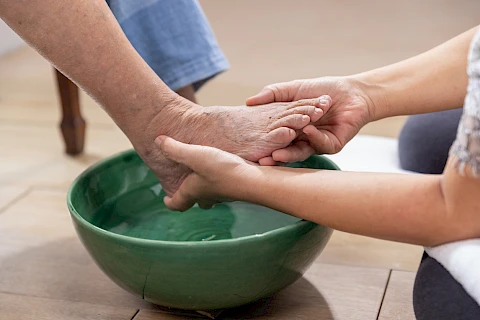
Diabetes can pose significant challenges to our senior loved ones, particularly when it comes to foot health. For caregivers, understanding how to support and maintain senior foot health is important. Seniors with diabetes are at a higher risk for foot complications, which can lead to serious consequences if not addressed promptly.
What Are the Risks?
Diabetes can lead to reduced circulation and nerve damage, making foot care an essential part of managing this condition. These issues can cause a range of foot complications, such as ulcers, infections, and, in severe cases, amputation. Being aware of these risks enables caregivers to take proactive steps in preventing complications and ensuring the overall well-being of their senior loved ones.
Daily Foot Inspections
Regular inspections are a vital part of senior foot health. Caregivers should check seniors' feet daily and look for signs of blisters, cuts, redness, swelling, or nail issues.
Here's a step-by-step guide for conducting a thorough inspection:
- Examine the tops, sides, soles, heels, and in between the toes.
- Use a mirror or ask for assistance if you have difficulty seeing certain areas.
- Look for abnormalities or changes, such as ingrown nails or color changes.
Recognizing early signs of complications can prevent minor issues from turning into major health concerns.
Proper Foot Hygiene
Maintaining foot cleanliness is critical in preventing infections. Caregivers should encourage seniors to wash their feet daily with lukewarm water and mild soap and dry them thoroughly, especially between the toes. It is also important to moisturize seniors' feet to prevent dry skin but avoid applying lotion between the toes where it can lead to fungal infections. When trimming nails, cut straight across to prevent ingrown toenails, and use a file to smooth any sharp edges.
Selecting Appropriate Footwear
The right shoes can also make a big difference in maintaining senior foot health. Look for diabetic-friendly shoes with a wide toe box for proper movement and reduced pressure, soft interior lining to prevent skin irritation, and adjustable closures for a snug fit that doesn't constrict. Proper fit and supportive footwear help distribute weight evenly across the foot, reducing the risks of ulcers and other problems.
Monitoring for Signs of Complications
Caregivers should be vigilant for symptoms that may indicate foot-related complications in seniors with diabetes. Warning signs include persistent pain or numbness, changes in skin color or temperature, and pus or an unusual odor, which might suggest infection. If you notice any of these symptoms in your senior loved ones, seek medical attention immediately to prevent worsening conditions. Early detection plays an important role in effectively managing senior foot health.
Collaborating With a Podiatrist
Regular visits to a podiatrist are a part of a senior's diabetes management plan. Podiatrists specialize in foot care and can provide personalized advice for maintaining senior foot health. Caregivers should work closely with the podiatrist to craft a care plan tailored to the senior's specific needs and conditions. Open communication with healthcare providers will ensure that caregivers are well-informed and equipped to handle any foot health challenges as they arise.
Senior Helpers Supports Seniors With Diabetes
Proactive foot care is paramount for seniors with diabetes, and caregivers play a significant role in providing this care. By implementing regular foot inspections, maintaining proper hygiene, selecting suitable footwear, and monitoring for signs of complications, caregivers can help maintain senior foot health and prevent serious issues.
Senior Helpers Greenwood & South Indianapolis is here to help seniors in Indianapolis, Greenwood, Columbus, and Marion County. Contact us today to learn how we can support you and your loved ones in managing diabetes-related foot health.